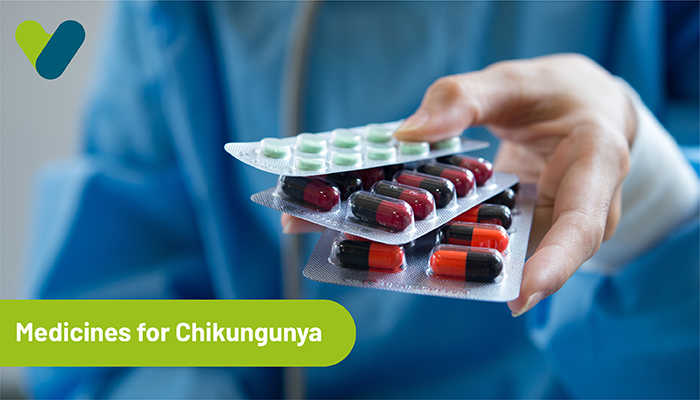Table of Contents
While chikungunya is usually harmless, serious complications such as meningo-encephalitis, bleeding manifestations, and fulminant hepatitis can occur in this condition. The treatment for chikungunya is typically symptomatic and supportive. There is currently no chikungunya vaccine available.
Symptoms of Chikungunya
The symptoms of the chikungunya disease usually appear after 3–7 days of being bitten by an infected mosquito.While fever and joint pain are the most common symptoms, other signs and symptoms may include muscle pain, headache, joint swelling, or a rash.
Individuals at risk for a more severe form of this disease include new-born babies infected around the time of birth, older adults (over the age of 65 years), and people with medical conditions, such as diabetes, high blood pressure, and/or heart disease.
The majority of individuals feel much better within a week after treatment; however, arthralgia (joint pain) can be severe and debilitating, and it can last for months. Chikungunya is a rare cause of death.
Risk Factors for Chikungunya
- Living near bodies of water: Mosquitoes thrive and breed in areas where there is standing water; therefore, people living in these areas are highly likely to contract chikungunya. Chikungunya is common in areas with standing water, such as construction sites and slums.
- Weakened immunity: People with weakened immunity, such as the elderly, children, and pregnant women, are likely to develop a severe form of the illness. The infestation is fatal in the elderly and can cause kidney issues, paralysis, liver problems, or cerebral problems.
- Rainy season: During the rainy season, mosquitoes breed and thrive more due to the abundance of stagnant rainwater in various places. As a result, most mosquito-borne diseases, including chikungunya, are highly prevalent during the rainy season.
Medicines for Chikungunya
There is currently no definitive recommended treatment protocol available for chikungunya. As a result, a wide range of prescription and non-prescription medications are used with different degrees of success. Many physicians concentrate only on supportive care and lowering the joint pain. Nonsteroidal anti-inflammatory drugs, antivirals (Ribavirin), and disease-modifying antirheumatic drugs (Methotrexate) are some of the most commonly used tablets for chikungunya.Nonsteroidal anti-inflammatory drugs (NSAIDS)
Over-the-counter NSAIDs are frequently used to help ease mild joint pain as well as to decrease fever in chikungunya patients and are the most commonly used treatment currently.
The majority of patients respond to NSAIDS, with approximately 89% experiencing immediate relief from pain to some extent. Although many doctors use NSAIDs to control symptoms, NSAIDs may only provide limited relief from pain and are only recommended in mild cases. There is currently no conclusive evidence of efficacy beyond moderate NSAID therapy in considerably severe cases.
Even though NSAIDs are frequently used in chikungunya-symptomatic patients, they should not be given until dengue is ruled out as a potential cause of the internal bleeding resulting from dengue. Paracetamol or acetaminophen can be used in these cases. Comorbid conditions such as heart failure or liver disease should be evaluated before using NSAIDs as some doctors may contraindicate the use of these drugs. NSAIDs are used despite their limitations because they provide relief in almost all patients and are widely available.
Disease-modifying antirheumatic drugs (DMARDS)
Methotrexate (MTX): MTX is another medication used in chikungunya treatment. Because of its anti-inflammatory properties, MTX helps reduce joint pain as well as joint swelling in chikungunya patients. MTX can be used as either monotherapy or combination (multidrug) therapy. MTX monotherapy has been shown in clinical trials to be effective in easing joint pain, whereas considerably higher pain relief has been seen in multidrug therapy groups with MTX. Multidrug therapy with MTX is commonly used in conjunction with hydroxychloroquine.
Antivirals
Ribavirin Ribavirin is an antiviral, which is studied for its potential therapeutic value in chikungunya patients. In clinical trials, patients with polyarthritis caused by the chikungunya infection who were treated with ribavirin reported improvements in pain and joint swelling. Also, patients reported improved walking progress as well as a reduction in edema; however, the dose of ribavirin required for human patients to be effective is associated with adverse effects such as hematologic and pulmonary complications.
Prevention of Chikungunya
- Precautionary measures should be implemented to reduce mosquito bites.
- Each individual should cover up and limit skin exposure.
- If the skin is exposed, it should be protected with skin repellents.
- The surrounding areas and environment should be checked and kept clean at all times.
- A build-up of water should be avoided.
- Nets should be used to avoid mosquito bites.
- DEET-containing mosquito repellent should be used.
- Natural insect repellents such as lemongrass can be used.
